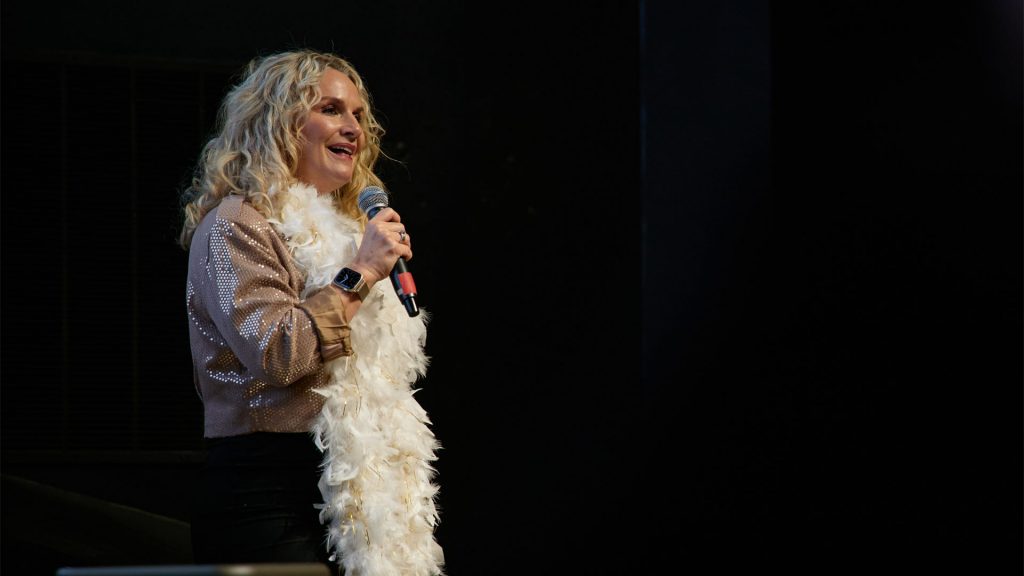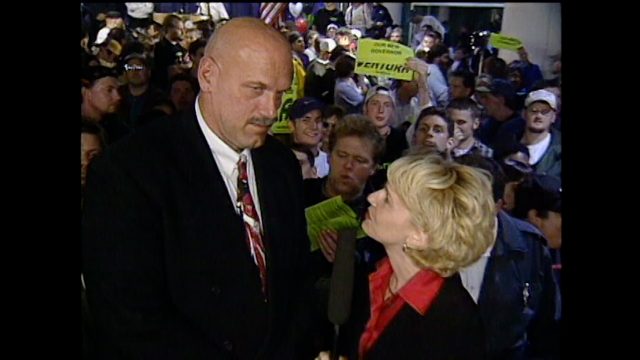
photo by Uche Iroegbu
Twin Cities PBS political reporter Mary Lahammer was an early-career journalist when Reform Party candidate Jesse Ventura made international headlines with his seemingly overnight transformation from pro wrestler to Minnesota governor. Following in the footsteps of her father, Gene Lahammer, a longtime reporter for the AP, Lahammer had a unique level of exposure to the fast-paced, male-dominated world of political journalism, a training ground that prepared her for the often-unpredictable Ventura. New in her role as a reporter for TPT’s public affairs show, “Almanac,” Lahammer almost immediately landed in the swirl of excitement and uncertainty that followed Ventura’s victory as the highest elected official in the state. During his time in office and beyond, she developed a level of trust with Ventura that led to decades of filmed interviews – and those interviews are the foundation for a new TPT film, “Jesse Ventura Shocks the World!,” that takes viewers on a rollicking journey to better understand his political impact today.
You can stream the film for free on the PBS App.
Why is the Jesse Ventura story important to you?
I guess it’s important to me because it’s my life’s work. I’ve been at TPT for quarter of a century, and it all started with Ventura. I started this job in ‘98 when he filed for office. It’s literally one of the first stories I covered and then to have this international news story just explode and drop in my lap as a new young reporter was an amazing opportunity.

Why do you feel his story is relevant today?
I’m stunned by how relevant the story ended up being, because of course we had to pick this a while ago and start production at least a year ago, and the latest polling now shows that it’s a record all-time high for independent party identification in the country right now, or more than 40% of Americans are identifying as independents – and he was an independent candidate. Party identification for Democrats and Republicans is down to 20-some percent. So I feel like that statistically is the best justification. [Editor’s note: A January 2024 Gallup poll shows that 43% of Americans identified as independents in 2023, tying a 2014 record. The data also shows that a record low of 27% identified as Republican or Democrat in 2023.]
After rewatching the interviews with Jesse Ventura, what new realizations have you experienced about his influence?
There’s one interview that stood out to me over his four years in office. I went back and watched the interview when he became the first governor to propose domestic partner benefits. He was advocating for LGBTQ rights, and I noticed how personal this was to him. And then putting that into context in the film, LGBTQ rights are fairly mainstream today and have gained a lot of public support in the country and in Minnesota. But we point out that, 25 years ago, liberal hero Paul Wellstone voted for the Defense of Marriage Act against same-sex marriage, when Ventura was instituting for state government employees same-sex partner benefits. And he, at the time would say, not only is it good for business, but we should do this as a good employer in the state – and the state is the largest employer in Minnesota. So it’s very relevant, but also he talked about how personal it was, how he had good friends who had been in a 40-year relationship and how cruel it was that one couldn’t visit the other in the hospital, and how he saw that as brutal and personal. And that was the interview where I thought he’s not acting, this is real. Looking back, I remembered thinking that was the best, most raw, most real interview.
What was it like from your perspective to be an early career female reporter in 1998, when many of your fellow reporters were likely men?
It was really a male-dominated field and actually I think it helped me with Ventura because it made me different. He also came to respect that I was plenty feisty and that you weren’t going to push me around.
Who are some of the women reporters you admire most?
Betty Wilson was one of the first reporters to cover the Capitol. I grew up with her because I grew up in the press corps, chasing my dad and all his colleagues around. Betty would tell stories about politicians who would refuse to talk to her, refuse to acknowledge her presence, would constantly comment on her wardrobe and say things like, “I only talk to people who wear pants.”
What do you hope people talk about when they see this documentary?
“Boy, that was really entertaining, engaging, but also educational.”
Is there anything else you want people to know about the story or about Ventura?
It’s easy to get caught in all the masculinity of his wrestling and his alpha male [persona] and the movies, but I wanted his mom front and center at the beginning of the story because I knew what a huge impact his mother had on him. He had talked to me about that, and I knew it formed his beliefs on women’s rights, on abortion access. He had a bill on his desk that he vetoed for abortion restrictions, and it all related back to his mom. So, I wanted her to be at the heart of the story. And his wife, whom he’s been married to for almost 50 years, is such an important influence – the love of his life.
Tell us about a story that didn’t make the final cut of the film.
You know, my father, who was a reporter before me and my mentor, watched the whole documentary through and said, “Where is Arnold? You missed Schwarzenegger.” We decided to focus on the Trump relationship because it’s more relevant right now with Trump leading his party in the presidential primaries.
Is there a comment or reaction to the documentary that has touched you the most?
I would say the one I got from Bill Hillsman, the creator of those [Ventura campaign] commercials. For him to say, “You got it right, you’re creating the record, and history is going to be correct on this one because this will be the ultimate kind of historic marker for what his time in office really was.” So that, that really hit me hard.
© Twin Cities Public Television - 2024. All rights reserved.
Read Next



